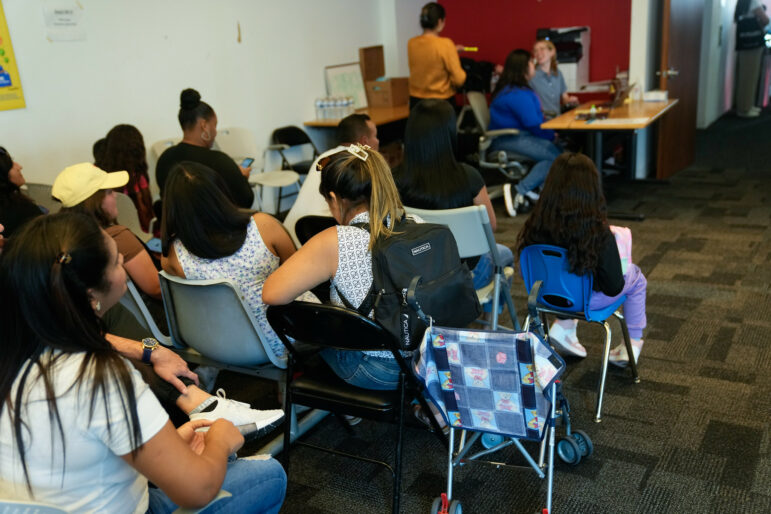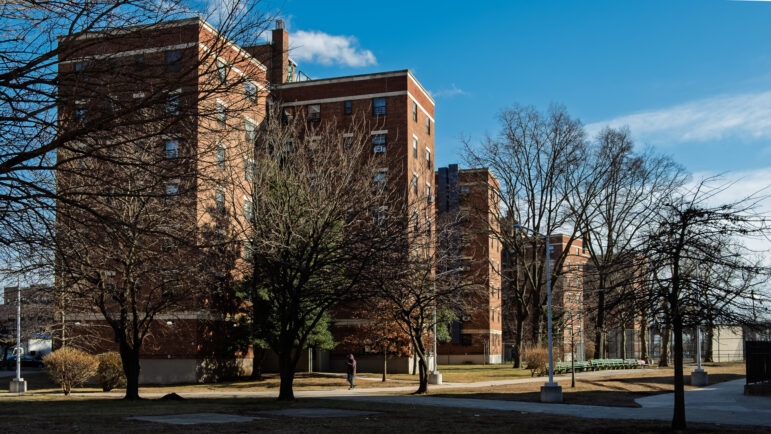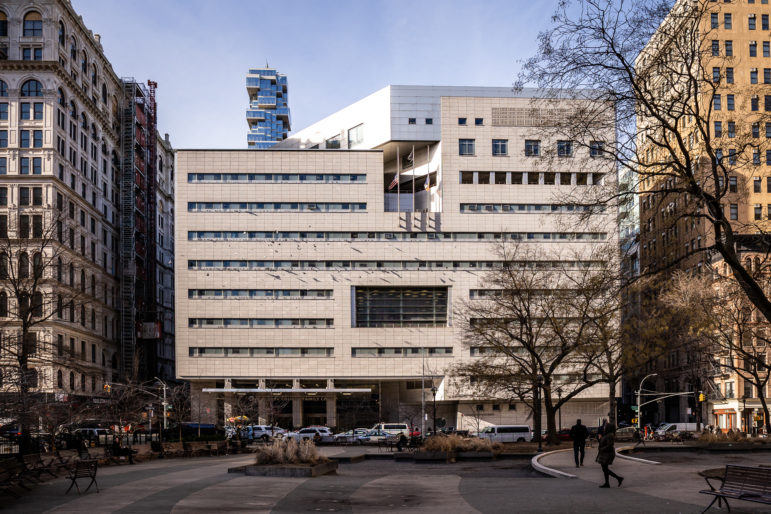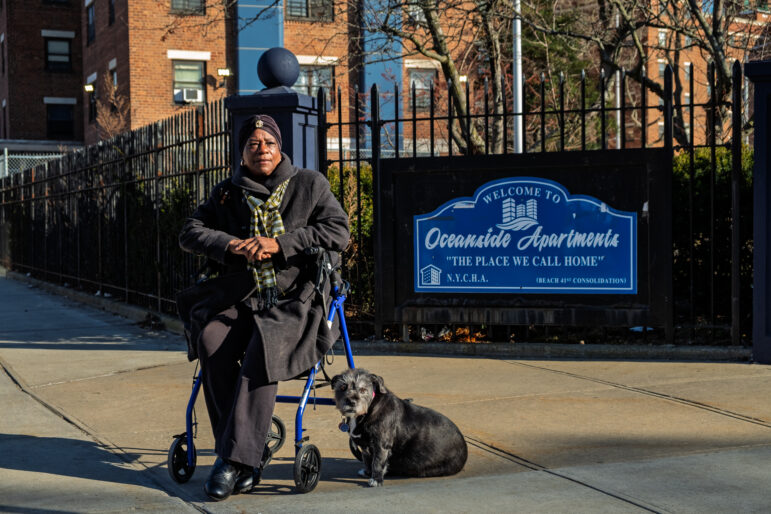The initial registration period for eligible Venezuelans who do not have TPS opened on Oct. 3 and will run through April 2, 2025. The governor and mayor recently announced funding to assist these and other newly-arrived immigrants: $30 million for legal services, and $8 million for case management. Here’s what we know.

Michael Appleton/Mayoral Photography Office
The city’s Asylum Seeker Application Center in Midtown Manhattan.Lea la versión en español aquí.
On Sept. 20, Department of Homeland Secretary Security Alejandro Mayorkas announced the extension and re-designation of Temporary Protected Status (TPS) to Venezuelan immigrants already in the United States.
TPS, according to the DHS, is designated “due to conditions in the country that temporarily prevent the country’s nationals from returning safely, or in certain circumstances, where the country is unable to handle the return of its nationals adequately.”
Millions of Venezuelan have left their country due to ongoing political and economic turmoil there, according to the UN Refugee Agency. Prior to the latest TPS extension, there were already some 240,000 Venezuelans covered by TPS in the United States, and this measure will add more than 472,000 people to the program.
While TPS itself “does not lead to lawful permanent resident status,” immigrants who apply for and are granted the designation can legally reside and work in the United States—a key point for those in New York, where the city recently instituted limits on how long newly arrived immigrants can remain in its shelter system, citing lack of capacity.
RELATED READING: Facing Shelter Deadlines, Asylum Seekers Navigate NYC’s Costly Rental Market
On Oct. 2, New York Gov. Kathy Hochul said that about 40 percent of the tens of thousands of immigrants who’ve arrived in New York over the last year were Venezuelan, but the exact figure has yet to be determined as the city develops a survey to find out who, and how many, might apply.
The initial registration period for eligible Venezuelans who do not have TPS opened on Oct. 3, running through April 2, 2025. Earlier this month, the governor and mayor announced funding to assist them and other asylum seekers with their cases: $30 million for legal services and $8 million for case management, detailed a spokesperson of the mayor’s office.
City Limits has prepared this guide to give an overview of where Venezuelans can look for help with applying for TPS in New York for the first time. Anyone in the city’s care—in or outside of the five boroughs—can reach out to be connected to legal services, explained a spokesperson of the mayor’s office.
Know something we missed and should include? Email us: Daniel@citylimits.org
Who is eligible for TPS under the recent re-designation to Venezuelans?
The TPS redesignation provides temporary protection from removal and the possibility to apply for employment authorization for Venezuelans residing in the United States on or before July 31, 2023.
The temporary status is granted by the United States Citizenship and Immigration Services (USCIS) and the initial application form is the I-821, Application for Temporary Protected Status, which costs $410. However “applicants should ask the person or organization helping them whether they may qualify for a Fee Waiver [I-912], which would eliminate the need to pay government fees,” said a spokesperson for the Mayor’s Office of Immigrant Affairs (MOIA).
What assistance is the city offering?
The city has contracted nonprofit legal service providers to run its free legal hotline, ActionNYC (available by calling 800-354-0365 Monday to Friday, 9 a.m. to 6 p.m.) as well as at the Asylum Application Help Center that opened this summer in midtown Manhattan. The providers involved in those efforts include Catholic Charities Community Services, the Asylum Seeker Legal Assistance Network (ASLAN), and the Pro Se Plus Project (PSPP), a partnership of seven nonprofit organizations.
While the ActionNYC hotline is a city program that existed prior to the influx of asylum seekers in the last year, it has been beefed up in recent months to handle “higher call volumes,” officials say. Venezuelans can also call 311 to make appointments and find local legal service providers, according to ASLAN.
For additional guidance, PSPP has created self-help videos and resources about completing the I-589 form (asylum application), the I-765 form (work authorization), while the nonprofit Venezuelans and Immigrants Aid has a video explainer about the I-821 application for TPS.
As part of the $38 million announced by the governor and mayor, more Application Help Center satellite sites are planned to open across the city. The Office of Asylum Seeker Operations (OASO), created in March to oversee and coordinate support services, “is currently planning a large-scale operation to maximize access to TPS application assistance for NYC shelter residents,” said a spokesperson of MOIA.
The office will announce additional locations for TPS application assistance on the ASLAN website soon.
What other organizations are offering assistance to Venezuelans with TPS in NY?
Project Rousseau, a non-profit that’s been greeting migrants as they arrive on buses at Port Authority, is providing social and legal services t families or to youth under the age of 22 in New York City. Both Venezuelans and Afghans (who also received a TPS redesignation) can pre-register for an appointment here, said the organization’s Chief of Staff Bethany Thorne.
Thorne said they’ve helped 91 families start the application process so far. Since Venezuela’s TPS re-designation was announced last month, demand has been so high that they’ve created a waiting list of about 200 people.
“We opened our offices to begin preparing applications at 8 a.m. the morning after the announcement and have mailed in applications already,” Thorne said.
Aid for Life, an organization that has been hosting donation drives since the influx of asylum seekers began last year, is offering a free legal clinic for migrants.
Recommendations
Organizations assisting migrants recommend they apply for the fee waiver, especially those living in shelters or living on a very low income, as the application fee and biometrics fee for a working-age adult can reach $545. For a comprehensive list of fees, click here.
If you are filing with a fee waiver, you will need two passport-style (2 inch square) photos to complete the work authorization application.
How to avoid scams and fraud
File with USCIS forms only, and do not pay for forms (all are free and downloadable online at www.uscis.gov/forms). Feel free to ask any preparer, attorney or organization to show you that they are accredited by the U.S. Department of Justice (DOJ) or an organization recognized by the DOJ.
Immigration assistance service providers—sometimes called “brokers,” “consultants,” or “accountants”—are people or businesses that charge fees for providing immigration aid. Check out the city’s Consumer Bill of Rights to learn more about what they can and cannot do, and what you’re entitled to under the law.
MOIA has also created an “Avoid Fraud” page for more detailed guidance and how to proceed if you’ve been a victim of fraud.
Launched in 2019, City Limits’ “What You Need to Know,” series aims to provide New York’s immigrant and Latino communities with practical information and explainers on a variety of topics. Is there an issue you think we should tackle next? Please send your suggestions to daniel@citylimits.org.
To reach the reporter behind this story, contact Daniel@citylimits.org. To reach the editor, contact Jeanmarie@citylimits.org








